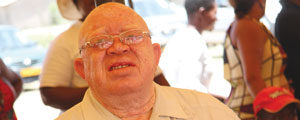
IN July 1996 my younger brother Thabo Nyathi died of skin sores.
Report by Richard Nyathi
In August the same year, I had the opportunity to travel to the UK for a short course. During the time I was in the UK, I gave myself the time to find out what manner of sores had killed my brother. I discovered that the sores were caused by skin cancer.
It occurred to me then that a lot of people like me must be dying, or at risk of dying from this apparently preventable disease. I decided that persons with albinism needed a representative body to fight for their right to health and life.
When I got back to Zimbabwe, obviously there was no person other than John Makumbe, who could have the capacity and courage to start this association. When I phoned him he was very enthusiastic about the idea.
He said he had also thought about the idea and, at one time or another, met and talked to a few interested persons.
So we met with a number of like-minded people, some of whom are in the association. That is when the Zimbabwe Albino Association known widely as ZIMAS came into being. Makumbe used his influence to fundraise for ZIMAS right from the beginning.
Through his efforts in 1997, ZIMAS was able to do a country-wide needs assessment survey. The survey revealed what we had feared. People with albinism were neglected in practically all aspects of social services.
- Chamisa under fire over US$120K donation
- Mavhunga puts DeMbare into Chibuku quarterfinals
- Pension funds bet on Cabora Bassa oilfields
- Councils defy govt fire tender directive
Keep Reading
There was no special provision for skincare or early skin cancer detection facilities in health centres in Zimbabwe. Skin cancer treatment was too expensive for even the very few employed people. Children with albinism endured harassment and abuse in schools from both teachers and fellow schoolchildren.
Employers were reluctant to employ people with albinism for fear of causing discomfort among other workers or frightening away potential clients. There was an unusually high rate of divorced parents of children with albinism. Parents could not understand how a completely different looking person could be their child.
Such children either remained with their mothers or were carted on to grand parents in rural areas to later die of overexposure to the sun. Persons with albinism died of skin cancer and rarely reached thirty years of age.
There are no official statistics on the number of persons with albinism in Zimbabwe. There is no information on the number of those with skin cancer infections. There is no official statistic on the number of persons with albinism who died of skin cancer in any given period. Therefore ZIMAS has had to rely on the 1997 survey results and on research done by such scholars as Patricia Lund.
In the early years, ZIMAS was lobbying for government action to alleviate the suffering of persons with albinism, but met a sceptical society.
What is disheartening is that, even the mainstream disability movement could not accept ZIMAS. Some leaders of the movement were hostile towards ZIMAS.
But with time and through our perseverance most of the stakeholders — the government included — began to understand the unique plight of persons with albinism.
In 2002, for the first time in the history of Zimbabwe, sunscreen cream was included in the essential drugs list. A year later in 2003, ZIMAS became a founder member of the all-embracing body of organisations of disabled persons in Zimbabwe called the Federation of Organisations of Disabled Persons of Zimbabwe.
I represent ZIMAS in the board. In 2006, I was appointed as a member in the National Disability Board for five years. I was reappointed in 2012 for a second term.
What all this means, Makumbe, is that our struggle is slowly bearing fruit. Yes, it has been hard. Yes, we still have not succeeded to move the government to honour its pledge to put sun cream medication in all its health centres.
Yes, there is still no single facility for early skin cancer detection and treatment in the country. Yes, our members are still dying of skin cancer because radiotherapy and chemotherapy is too expensive.
That is why Makumbe, we fervently pray and hope that your sterling work in fighting for the rights of persons with albinism will not end here.
I do hope and pray sooner than later we will see skincare medication made available in all health centres in Zimbabwe. We hope and pray that early skin cancer detection equipment will be made available in each town in Zimbabwe.
We hope and pray that children with albinism will have a better opportunity to be afforded accessible education and employment when they reach adulthood.
We pray and hope that your work Makumbe will not wither away now that you are gone, but instead will eventually give the results that you tirelessly worked for over 16 years!
God bless you Professor Makumbe. To us you were and still are a star!











